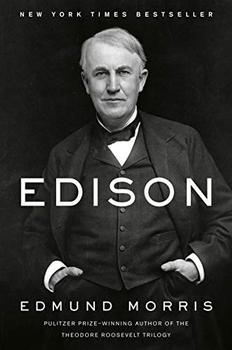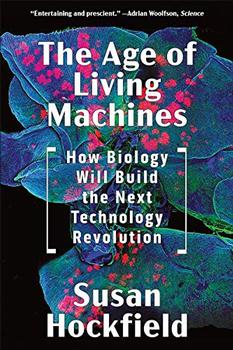Summary | Excerpt | Reviews | Beyond the book | Read-Alikes | Genres & Themes | Author Bio

October 22nd, 2019 marked the 140th anniversary of the first successful test of a commercial electric light bulb with a carbon filament, commonly known as an incandescent light bulb. It seems fitting that in the same year the man behind this life-changing invention, Thomas Alva Edison, should be honored in a dense doorstopper of a new biography. Edison is the final work of Pulitzer Prize-winning author Edmund Morris, who finished the book shortly before his death in May 2019; Morris is most famous for his highly regarded three-volume biography of Theodore Roosevelt. Here, Morris digs deep into the frenetic mind of Edison, but his well-researched study sometimes suffers from its overabundance of detail and mystifying reverse chronology.
Thomas Alva Edison was born into abject poverty in 1847, but he revealed at an early age his prodigious intellect and precocity. Self-educated and almost manic in his desire to help others, he created dozens of useful inventions. A few of his most prominent include the phonograph, the carbon telephone transmitter, the commercial fluoroscope, and, of course, the modern incandescent light bulb (see Beyond the Book to learn about 10 of his most important inventions).
What stands out immediately is the author's bold decision to write Edison's life backward. The book begins with the inventor on his deathbed, having already attained fame. Each chapter then jumps back a decade and centers on the scientific problem that preoccupied Edison's attention at the time. The end focuses on his childhood, and only then do readers finally meet the person most responsible for setting young "Alva," as he was called in youth, on his path to international renown: his mother, Nancy Edison. This structure is bizarre, disorienting, and frustrating. It doesn't facilitate a deeper understanding of Edison than a conventional approach would, and it undermines readers' ability to easily understand the course of his life and work.
At well over 800 pages, however, Edison comes closer to capturing the complexities of the inventor's mind than any other biography. The massive amount of detail included is impressive, even if it makes for occasionally tedious reading. As Morris recounts all of Edison's major obsessions — botany, chemistry, magnetism, light, sound, telegraphy — he confidently assumes readers understand the nuances of each discipline and the specific scientific challenges Edison faced in his experiments. Lay readers will find it difficult to follow these incredibly specific sections, which slow down the narrative.
Morris also does lopsided work of interweaving the personal and the professional. He dedicates pages and pages to Edison's business dealings, experiments, and jokes told around the workroom with assistants, but only occasionally considers his private life. Truthfully, the writer spends as much time considering the inventor's wives and children as he himself did. Edison was a man of ideas who often worked 20+ hour days; he very rarely spent nights at home, instead sleeping in his laboratory.
Morris nevertheless paints poignant portraits of the wayward and mostly forgotten children of Edison's first marriage: Marion, Thomas Edison, Jr., and William. These children longed to be loved and accepted by their work-obsessed father. Marion especially suffered since her father was more invested in her brothers' success, but she ultimately rose above his aloofness and lived a satisfying, well-adjusted life. These beautifully rendered parts offer heart to a cerebral narrative, but they are too fleeting and sporadic for a book of this size and scope.
The story of Edison and his inventions is ably told by Mr. Morris in authoritative, commanding prose, but it also is at times technically challenging and gimmicky. Because of its sheer amount of detail, however, Edison will likely stand as the definitive biography on Thomas Alva Edison for many years to come.
![]() This review was originally published in The BookBrowse Review in October 2019, and has been updated for the
November 2020 edition.
Click here to go to this issue.
This review was originally published in The BookBrowse Review in October 2019, and has been updated for the
November 2020 edition.
Click here to go to this issue.

If you liked Edison, try these:

The Mysterious Case of Rudolf Diesel
by Douglas Brunt
Published 2024
The hidden history of one of the world's greatest inventors, a man who disrupted the status quo and then disappeared into thin air on the eve of World War I - this book answers the hundred-year-old mystery of what really became of Rudolf Diesel.

by Susan Hockfield
Published 2020
From the former president of MIT, the story of the next technology revolution, and how it will change our lives.
A book is one of the most patient of all man's inventions.
Click Here to find out who said this, as well as discovering other famous literary quotes!
Your guide toexceptional books
BookBrowse seeks out and recommends the best in contemporary fiction and nonfiction—books that not only engage and entertain but also deepen our understanding of ourselves and the world around us.